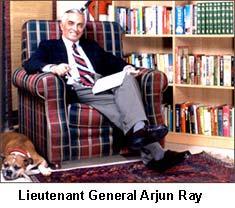Home > News > Specials
The Rediff Special/M D Riti
March 03, 2003



They come from a state torn by years of warfare and troubled by militancy. A state where the gun has ruled for years and women have only mourned the dead. Suddenly, 19 young women from Ladakh in the remote region of Jammu and Kashmir find themselves going to college in Bangalore and daring to dream of a future. A year ago, none of them could have imagined leaving their strife-torn home state and moving to a city for studies. Their benefactor, Lieutenant General Arjun Ray, who has retired to Bangalore, not only got them admitted to graduate courses in science and commerce at BNM College, Banashankari; he even set up a separate hostel for them nearby. "This is just an extension of Operation Sadbhavana, my attempt to bring peace to the troubled regions of Ladakh and Kargil," says General Ray, his light-coloured eyes sparkling as he talks about a subject obviously close to his heart. "I may have retired from the army, and can no longer officially be a part of this operation, but I will definitely carry it forward privately." General Ray wears a different hat in Bangalore. He is chief executive officer of a new international school that will open its doors in July. "I firmly believe there is a great need for the right type of education in India," he says. "I think my experience in the army would help me fulfil that need."  Recalling the beginning of Operation Sadbhavana, he says, "When I took over in Ladakh, militancy had begun spilling over into that region. There were calls for azaadi, caches of arms being found everywhere. I realised this was only because of a total alienation of the public by the army. The gun could never be an answer to this problem. It had been tried, and had failed miserably." Recalling the beginning of Operation Sadbhavana, he says, "When I took over in Ladakh, militancy had begun spilling over into that region. There were calls for azaadi, caches of arms being found everywhere. I realised this was only because of a total alienation of the public by the army. The gun could never be an answer to this problem. It had been tried, and had failed miserably."
India, he points out, has fought four wars with Pakistan. It is also fighting a proxy war with its neighbour since 1989. But there is no solution in sight. "With the empowerment that the information revolution has given us, it is time to stop taking recourse to the gun for everything," he says. "What Mao Zedong once said, political power comes from the barrel of a gun, is no longer valid." Peace, he feels, is what everyone should actively work for. In Jammu and Kashmir, there was no peace because the people were unhappy with the army's regime. Ray decided it was time to win them over. "They had endured us for 11 years and we had to do something to make them think better of us," he says. His solution, which took the form of Operation Sadbhavana, was quite simple. He began by working in the area of primary education, setting up 13 state-of-the-art schools. Then came six hospitals, 11 women's empowerment centres, and 60 adult education centres. Free computer centres were set up everywhere. The general also organised free cardiac care, right up to the tertiary level, for those in need. Patients were flown to Mumbai and Delhi for expensive treatment, which was given free. A severe water shortage, caused by two droughts resulting from poor snowfall, saw Operation Sadbhavana work towards water management and harvesting. It was then General Ray discovered the enemy he had to fight hardest to achieve his goal was the army itself. "Its attitude towards the locals, and towards this entire issue, was very hard to change," he admits. "In fact, I spent half my time in Operation Sadbhavna on re-educating the army." Just how did he achieve this finally? "Mostly by setting an example of how to behave," he says. "If you are a good leader, people try to emulate you. You also have to make them understand the need for change. But you must also remember that, in India, people prefer homoeopathic change to surgical change. Implementing any kind of change takes a lot of time. You cannot expect miracles."  Which is why General Ray brought the 19 adolescents with him when he moved to Bangalore. Seven of them are Muslim; the remaining, Buddhist. "I chose girls who were bright, very poor, and in the age group of about 17 years," he says. The girls' parents were more than willing to trust him. But after the girls featured in the city pages of a Bangalore daily, they say they are attracting a lot of unwanted attention. He, therefore, requested rediff.com to neither meet them nor photograph them. "They hate being identified by passers-by as 'those poor girls' from Ladakh," he explains. Which is why General Ray brought the 19 adolescents with him when he moved to Bangalore. Seven of them are Muslim; the remaining, Buddhist. "I chose girls who were bright, very poor, and in the age group of about 17 years," he says. The girls' parents were more than willing to trust him. But after the girls featured in the city pages of a Bangalore daily, they say they are attracting a lot of unwanted attention. He, therefore, requested rediff.com to neither meet them nor photograph them. "They hate being identified by passers-by as 'those poor girls' from Ladakh," he explains.
German multinational BASF has partly sponsored the girls and their hostel. But General Ray looks after their day-to-day needs, like paying for a fresh pair of spectacles or buying an expensive textbook. "My goal is to bring a total of 100 girls to Bangalore," he says. "I wish corporate houses or NRIs would support me in this endeavour. It would cost about Rs 45,000 per girl per girl per annum, or a total of about Rs 1.7 lakh per girl for five years." He is also trying to get army funds for this venture. But, in the year after General Ray left Ladakh, Operation Sadbhavana has lost some of its momentum. Why did he retire early? "I was transferred out of Ladakh," he says. "And after Sadbhavana, there was no challenge for me. I feel life should have a higher purpose than the endless pursuit of power and higher office." His achievement in stemming militancy in the region and enlisting the co-operation of the locals has been widely acknowledged. He has also begun work on a book on how to win over alienated communities in India, based on his experiences in Ladakh. Once his school starts functioning, he hopes to devote more time to his manuscript. The S P Jain Institute in Mumbai and BASF will be involved in its publication. "I achieved what I did by winning over the Muslim community there," General Ray says simply. "After all, in a population of one billion in India, about 350 million people belong to disadvantaged communities, and about 140 million are Muslims. We cannot afford to have such a sizeable chunk of our population feeling marginalised and disgruntled. I firmly believe it is as important for our Gross National Happiness index to be high, as it is for our socio-economic indices to be high!" Those interested in contacting General Ray can write to arjunray13@rediffmail.com
The Rediff Specials

|
What do you think about the story?

|

|

|

|
Read what others have to say:
|

|

|
Number of User Comments: 10
|

|

|

|

Sub: something extra
Hats off to Gen.Ray,i wish some more powerful & intelligent people could follow his example after all there is no dearth of such Indians in ...

Posted by suruchi saini

|

|

|

|

Sub: Doctors from Ladakh
Lt Gen Arjun Ray is a true soldier and a great Indian. Inspiring by leading a peace 'war' for the hearts and minds of the ...

Posted by Rajeev Singh

|

|

|

|

Sub: Congratulations
I was greatly heartened to read the article about the General's approach to life. Most heartening and may he achieve great success in all his ...

Posted by Prem Hejmadi

|

|

|

|

Sub: Excellent article, plus gives me a chance to help
Nice article. Also by giving the contact info about Lt General Ray, we get a chance to help him. Thanks Ashish

Posted by Ashish Mehta

|

|

|

|

Sub: Shambhala
This is just an attempt to destroy peace-loving Laddakhi culture. Why dont they build educational facilities inside Laddakh. Just like annexation of Sikkim, it is ...

Posted by kirparaj

|

|

|
|

Disclaimer

|